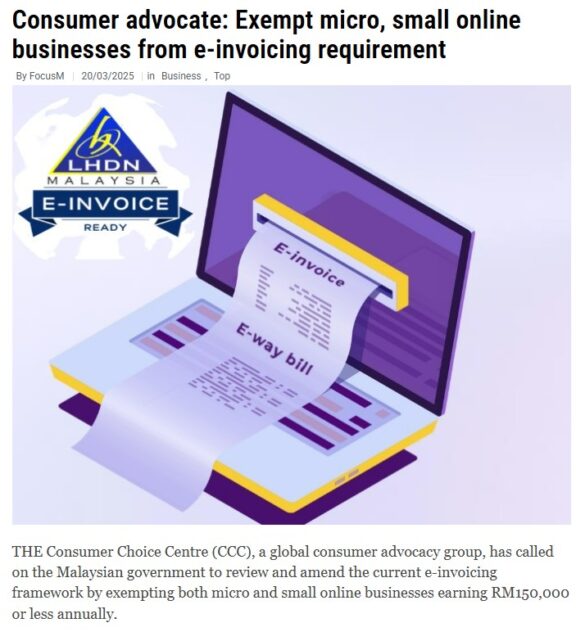SMALL businesses nationwide are preparing for a major transition as Malaysia moves towards mandatory e-invoicing.
Beginning July 1, all taxpayers, including micro, small, and medium enterprises (MSMEs) – both brick-and-mortar and online – are required to implement e-invoicing.
While digital transformation is essential for economic progress, many micro-entrepreneurs and small traders face immediate challenges in adapting to the new system.
To ease the transition, the government has exempted physical businesses with annual sales below RM150,000 from e-invoicing requirements.
However, this exemption does not extend to online sellers regardless of their revenue size – a regulatory inconsistency that has sparked concern among industry groups and small business owners.
Towards this end, the Small and Medium Enterprises Association (SAMENTA) has urged the government to raise the exemption threshold to RM300,000, thus aligning it with the official definition of micro-enterprises.
‘Unlevelled playing ground’
“Small traders with sales below RM150,000 are already exempted from the e-invoicing regime,” justified the grouping’s national president Datuk William Ng.

“While SAMENTA has called for this threshold to be doubled, the real impact is on brick-and-mortar traders. What is crucial is for small traders to update their eligibility (or otherwise) based on the RM150,000 cut-off so as to ensure they are complying correctly to the e-invoicing regime.”
For online traders, Ng told FocusM that “e-invoicing for small traders is automated via the major online marketplace platforms”.
But stakeholders point out that such automation does not eliminate the pressures faced by small businesses that are juggling with rising costs, tighter margins and administrative complexities.
“Small businesses are already grappling with rising costs and operational pressures. Inconsistencies in regulations further complicate matters,” observed the Consumer Choice Centre (CCC) Malaysia country associate Tarmizi Anuwar.
“Businesses earning less than RM150,000 annually on e-commerce platforms must comply with e-invoicing regulations while physical retailers under the same threshold remain exempt.


“This difference in regulations creates challenges for online sellers. Shouldn’t all small businesses be given the same regulatory treatment, regardless of where they operate?”
Moreover, Tarmizi contended that RM150,000 in annual revenue is a modest amount, hence imposing compliance burden on businesses of this scale risks discouraging entrepreneurship and digital adoption.
“Instead of helping businesses grow, excessive regulation can lead to higher costs which ultimately trickle down to consumers in the form of higher prices,” he projected.
“A more business-friendly approach would be to exempt all small businesses – both online and offline – from such requirements until they reach a higher revenue threshold.”
Protect interest of small traders
Zul, a representative of a local car accessory business, echoed these concerns. Although he outsources his financial management, including e-invoicing compliance, he is increasingly worried about the rising costs.

“Compliance requirements are complex. Higher costs could mean tighter profit margins or even increased prices for customers,” he explained.
“My biggest worry lies with my small-scale distributors who sell my car accessories to end customers through their own online shops.
“Many of them lack the resources, manpower or technical know-how to keep up with new digital compliance demands. Operating on thin margins, they are unable to afford external assistance or hire extra staff, thus making the e-invoicing requirement a heavy burden.”
Zul further fears that if compliance costs become too high, some distributors may be forced to stop selling altogether.
“It’s a pity because these small distributors are the backbone of our business. On this note, I urge the government to consider exemptions or provide more flexibility to small online businesses, thus ensuring that regulations do not inadvertently push them out of the market.”
Industry advocates warn that without fair and consistent policies for all small businesses – regardless of whether they operate online or offline – the country’s ambition to advance its digital economy could come at the cost of its smallest players. – March 25, 2025









